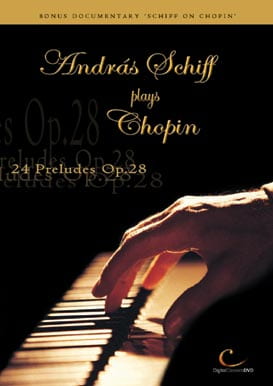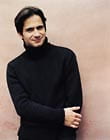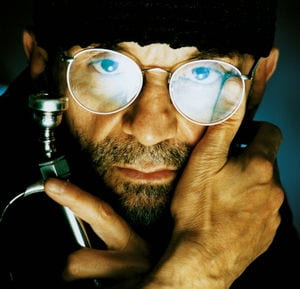Polish Music Center Newsletter Vol. 12, no. 6
PMC News: Students
Maciej Flis
Continuing the spotlight on Polish musicians affiliated with the USC Thornton School of Music and the Polish Music Center, we are happy this month to present Maciej Flis, another spectacular young talent from Poland and a truly fascinating personality.
Maciej was born and raised in Łódź. His musical education began with the studies of piano at the age of seven, changing to the bassoon at the age of fourteen. After his primary and secondary education, Maciej studied with a noted bassoon virtuoso and conductor, Professor Krzysztof Kamiński at the Bacewicz Academy of Music in his native Łódź, and graduated in 2003 with a Master of Arts in Bassoon Performance.
Already during his studies Maciej performed with the Rubinstein Philharmonic Orchestra in Łódź and participated in numerous festivals in Poland and abroad. After one such performance at the Bayreuth Festival in 2001, Maciej was invited by then USC Dean of Music Larry Livingston to participate in the 2001 Idyllwild Summer Festival. This led to Maciej’s audition and his winning of the Flossie Meline Oliver Pieper Music Scholarship at the University of Southern California. At first Maciej worked with a bassoon legend, Steven Maxym; later with the highly esteemed Professor Judith Farmer. Completing his American education studies with a perfect academic record, Maciej was awarded a Graduate Certificate in Advanced Studies in 2005 and had since then been an active performer and teacher in the Los Angeles area.
Shortly after arriving in California in 2002, Maciej was offered the position of co-principal with the American Youth Symphony, and has performed with this orchestra ever since. In addition to his orchestral playing, Maciej has made numerous solo tours of Germany, United States, and Poland. The long roster of symphony orchestras and conductors Maciej has worked with in the past few years includes the Pasadena Symphony, Brentwood Symphony, Downey Symphony, Saddleback College Orchestra, Culver City Chamber Orchestra (including Sony Pictures Entertainment for the 2003-2004 Children’s Concert Series) and such towering musical personalities as Esa-Pekka Salonen, Sergiu Comissiona, Larry Livingston, John Williams, and Carl St. Clair.
Maciej Flis also had the privilege of performing with world-famous soloists and ensembles, including Yo-Yo Ma, Norman Krieger, Yefim Bronfman, and The Wayne Shorter Quartet, among others, and appeared on stage at Carnegie Hall, Walt Disney Concert Hall, Dorothy Chandler Pavilion, Royce Hall, and Colburn School of Performing Arts. Maciej is often invited to participate in recording sessions for all major film studios, including 20th Century Fox Studios, Paramount Pictures Studios, and Warner Bros. In addition to numerous public radio broadcasts, Maciej’s recorded performances include the In Session CD of the Henry Mancini Institute Orchestra (made at the 20th Century Fox Newman Scoring Stage in 2004), and a program of works by Mozart with the Lvov Chamber Orchestra, dating from 2001. Most recently, Maciej participated in the 75th Anniversary Gala Celebration of the USC School of Cinema and Television, hosted by Steven Spielberg and attended by such celebrities as George Lucas, Frank Pierson, Clint Eastwood and Ron Howard in 2005.
Currently Maciej Flis performs with the Midnight Quintet, a wind ensemble group founded in 2003. Recently the Quintet won the 2006 USC Educational Outreach Fellowship Award and gave several concerts at the Chamber Music Sedona Festival in May of this year. The Midnight Quintet’s week-long residency in Arizona included performances at local schools and benefit concerts. This summer, the Quintet will appear in the Arcosanti Chamber Music Series and participate in the two-week Idyllwild Chamber Music Festival in California. In the coming months, the Quintet is also making plans for a CD of music by American and Polish composers.
Maciej Flis has recently been awarded a scholarship from the California Institute of the Arts that will enable him to continue studying music in the United States. Maciej’s future goals include winning a seat in one of the major American symphony orchestras and continuing to play on recording sessions for various film studios. Maciej’s hobbies include travel, photography, and aviation—he is currently training to receive his private pilot license.
Perhaps the best summary of Maciej’s musical accomplishments comes from some of the professional musicians who worked with him in the past few years. According to Prof. Livingston at USC: “In every way, Maciej is a superb young artist. He has a lovely tone quality, fine technique, and an unusually keen mind. In my career spanning more than forty years in the profession, I have had the opportunity to work with literally hundreds of talented young musicians. I would rate Maciej in the top 5 percent of that group.” The composer and conductor Patrick Williams summed-up Maciej’s talent as follows: “I wish to state for the record that Mr. Flis is clearly and unambiguously one of the finest and most extraordinary of emerging professional musicians in the music industry. […] I can state, without hesitation, that he is the great asset to the industry.”
The Polish Music Center is very pleased to have Maciej perform on several occasions in concerts that we’ve organized at USC and in the greater Los Angeles area. Without a doubt, he represents the very best in musical talent that the Polish culture can truly be proud of. Should you like more information on Maciej’s life and accomplishments, please visit his website at: www.flismac.com, as well as that of the Midnight Quintet: www.midnightquintet.com.
News
65th Death Anniversary Of Paderewski
 Ignacy Jan Paderewski, the great composer, pianist, statesman and philanthropist, died in New York City on June 29, 1941. A number of events are being planned in the United States and Poland to commemorate this anniversary. The Polish Government is coordinating a number of concerts, seminars, and lectures throughout Poland.
Ignacy Jan Paderewski, the great composer, pianist, statesman and philanthropist, died in New York City on June 29, 1941. A number of events are being planned in the United States and Poland to commemorate this anniversary. The Polish Government is coordinating a number of concerts, seminars, and lectures throughout Poland.
In the United States, two main events will mark the anniversary. The first will be a concert and auction of portraits of Paderewski at the Polish American Museum in Chicago at 2 p.m. on Sunday, June 18, 2006. This event is being organized by Anya Dudzik and Bogdan Lodyga. A concert of the works of Paderewski and Chopin will be performed by the brilliant pianist, Sasha Zintchenko. Following the concert there will be an auction of several portraits of Paderewski by prominent Polish-American artists. The Polish translation of “It Takes One to Tango” by Ambassador Edward L. Rowny will be sold. The proceeds from the auction and book sales will go to the Paderewski Scholarship Fund. The second event will be a piano concert at the Polish Embassy in Washington, D.C. at 7 p.m., Friday, June 23. The works performed will be by Paderewski and other contemporary artists by the internationally renowned pianist, John Robilette.
The White House is preparing a Presidential Proclamation marking the Anniversary. Senate and House Resolutions are being prepared by Senator Chuck Hagel and Congresswoman Marcy Kaptur. A parallel Presidential Proclamation is being prepared by the President of Poland as well as a Resolution by the Polish Sejm.
ZKP “60 for 60”
 A press conference organized by the Polish Composers’ Union [Związek Kompozytorów Polskich (ZKP)] on May 17, 2006 marked the conclusion of the “60 for 60” project. The idea behind the project was to commission over 60 new compositions for the 60th anniversary of the Union. The project is backed financially by the Ministry of Culture and National Heritage and the Polish Composers’ Union. “60 for 60” is being realized with help of the “Signs of the Time” program, which specializes in supporting contemporary art and is governed by the National Culture Center.
A press conference organized by the Polish Composers’ Union [Związek Kompozytorów Polskich (ZKP)] on May 17, 2006 marked the conclusion of the “60 for 60” project. The idea behind the project was to commission over 60 new compositions for the 60th anniversary of the Union. The project is backed financially by the Ministry of Culture and National Heritage and the Polish Composers’ Union. “60 for 60” is being realized with help of the “Signs of the Time” program, which specializes in supporting contemporary art and is governed by the National Culture Center.
Among the composers writing for the project are, among others: Bogusław Schaeffer, Zbigniew Bargielski, Paweł Szymański, Roman Berger, Aleksander Lasoń, Szabolcs Esztenyi, Paweł Mykietyn, Mikołaj Górecki, Jan Wincenty Hawel, Grażyna Pstrokońska-Nawratil, Piotr Moss, Hanna Kulenty, Stanisław Kupowicz, Maciej Małecki, Lidia Zielińska, Michał Talma-Sutt, Anna Zawadzka-Gołosz, Dobromiła Jaskot and Wojciech Ziemowit Zych. Among the ensembles involved in the project are: Sinfonia Varosovia, the National Philharmonic and the Polish Radio National Symphony Orchestra. Until now, most of the commissions offered to Polish composers came from international rather than Polish national sources; it is hoped that the “60 for 60” program will help to change that trend.
New Polish Masses
Jacek Sykulski
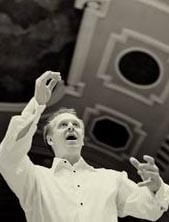 Polish composer Jacek Sykulski recently presented fragments of his new mass, written especially to commemorate the 50th anniversary of “Poznań June 1956”. Missa 1956 will be the musical background of the special mass and celebration on the 28th of June 2006 in Adam Mickiewicz Square. The composition was commissioned by the Poznań government as part of the commemorative events. Jacek Sykulski will serve as conductor and director of the Choir of the Adam Mickiewicz University and Poznań Boys Choirs.
Polish composer Jacek Sykulski recently presented fragments of his new mass, written especially to commemorate the 50th anniversary of “Poznań June 1956”. Missa 1956 will be the musical background of the special mass and celebration on the 28th of June 2006 in Adam Mickiewicz Square. The composition was commissioned by the Poznań government as part of the commemorative events. Jacek Sykulski will serve as conductor and director of the Choir of the Adam Mickiewicz University and Poznań Boys Choirs.
On June 28, 1956 Poznań factory workers from the Stalin Factory started a general strike, demonstrating in the streets with slogans of freedom and democracy. The confrontation with police and soldiers resulted in the deaths of 70 people and a few hundred injuries. The youngest victim of the fighting was a 13 year old boy.
Wojtech Mrożek
 Polish composer and clarinetist Wojtech Mrożek has just finished writing his new mass entitled Missa Solemnis Sandomieriensis “Beati Mundo Corde” – Prayer with John Paul II, dedicated to the Polish Pope. The composition was commisioned by the Mayor of Sandomierz and received official honorary patronage from the bishop of Sandomierz, Andrzej Dzięga, and the Polish Minister of Culture and National Heritage.
Polish composer and clarinetist Wojtech Mrożek has just finished writing his new mass entitled Missa Solemnis Sandomieriensis “Beati Mundo Corde” – Prayer with John Paul II, dedicated to the Polish Pope. The composition was commisioned by the Mayor of Sandomierz and received official honorary patronage from the bishop of Sandomierz, Andrzej Dzięga, and the Polish Minister of Culture and National Heritage.
The work consists of 24 movements enclosed in the traditional 5 part mass structure. Integrated into the mass are sections that require historic audio and/or video reproductions of the Pope’s homilies. The work is quite monumental, requiring a full symphony orchestra, choir and 5 soloists. It will be premiered in Sandomierz on June 11 by the Silesian Philharmonic Symphony Orchestra and Choir, Iwona Hossa – soprano, Mieczysław Bąk – boy soprano, Agata Sava – mezzo soprano, Vasyl Ponajda – tenor, Józef Frakstein – bass. The concert will be conducted by the composer.
New Director Of Poznań Phil
Wojciech Nentwig, music critic, reporter and head of the cultural chapter of the Głos Wielkopolski newspaper has been appointed as the new executive director of Poznań Philharmonic. Nentwig is also the vice-president of the Henryk Wieniawski Society. Nentwig has replaced Grzegorz Nowak at the Philharmonic after a controversy surrounding Nowak’s contract and compensation as executive director. Also, there were troubled relations between Nowak and the orchestra and a conflict with the musicians union. The new director will officially start on June 16 as managing director and he will have his choice of any artistic director and conductor. In the meantime, Grzegorz Nowak is suing the Philharmonic in labor court for compensation for early contract cancellation.
PIASA Conference
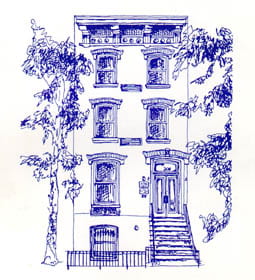 The 64th Annual Meeting of the Polish Institute of Arts & Sciences of America, (PIASA) will be held on June 3-4, 2006 at Hunter College, City University of New York. It will be hosted and co-sponsored by its School of Arts & Sciences. It is expected to attract over 300 scholars and students in the fields of Polish, East European, and Polish-American studies, with some twenty-four sessions and panels in various disciplines, including politics, literature, economics, history, music, art, the natural sciences, and ethnic studies.
The 64th Annual Meeting of the Polish Institute of Arts & Sciences of America, (PIASA) will be held on June 3-4, 2006 at Hunter College, City University of New York. It will be hosted and co-sponsored by its School of Arts & Sciences. It is expected to attract over 300 scholars and students in the fields of Polish, East European, and Polish-American studies, with some twenty-four sessions and panels in various disciplines, including politics, literature, economics, history, music, art, the natural sciences, and ethnic studies.
For further information on the full program or advance registration, please visit the Polish Institute’s website at www.piasa.org. Regarding availability, or for any other inquiries, please contact Dr. Gromada, Executive Director, the Polish Institute, 208 East 30th St., New York, NY 10016, call (212) 686-4164, fax (212) 545-1130, or e-mailpiasany@bellatlantic.net .
The Polish Institute of Arts & Sciences of America is a national academic organization dedicated to the advancement of knowledge in general and to the advancement of knowledge about Poland’s intellectual and cultural heritage. The Institute’s Library and Archives serve as a research center for the study of Poland and East Central Europe. Since 1956 the Polish Institute has published a scholarly journal, The Polish Review.
Wratislavia Cantans Program
This internationally recognized music festival will not begin until September 9, 2006, but the artists and concerts of the event were just announced. This year’s edition will include some of the greatest ensembles and musical personalities in the world. Jerzy Semkow will conduct Sinfonia Varsovia with Brukner’s VII Symphony, the Polish Radio National Symphony Orchestra will perform Honegger, and the Gabrieli Consort & Players will perform Mozart’s Mass in C Minor, conducted by Paul McCreesh. Other great ensembles and artists include: Kammerorchester Basel, Hilliard Ensemble, and Fretwork Ensemble, consisting of 15 viola da gamba players. During the 15-day festival, there will be 47 concerts performed by musicians from 11 countries. For details please visit the official website of the festival at: www.wratislavia.art.pl.
Polish Festival In England
 There is a new Polish Summer Festival in Jersey, England, running from June 9 to 14. The idea of the festival is to give the Polish people of Jersey the chance to feel pride in their homeland and its people, and to give non-Polish residents the chance to appreciate the richness of Polish society. Even though the 10,000 Polish people who have made their way to Jersey are far from home, the influence of its culture, cuisine, music, customs and celebrations remains very strong. There will be a variety of cultural events that reflect Polish traditions but also explore the best of contemporary Polish culture through film and music, and by providing a platform for creative expression for Jersey’s many young Polish artists.
There is a new Polish Summer Festival in Jersey, England, running from June 9 to 14. The idea of the festival is to give the Polish people of Jersey the chance to feel pride in their homeland and its people, and to give non-Polish residents the chance to appreciate the richness of Polish society. Even though the 10,000 Polish people who have made their way to Jersey are far from home, the influence of its culture, cuisine, music, customs and celebrations remains very strong. There will be a variety of cultural events that reflect Polish traditions but also explore the best of contemporary Polish culture through film and music, and by providing a platform for creative expression for Jersey’s many young Polish artists.
The opening night of the festival will feature a Piano Recital played by Stanislaw Drzewiecki at Jersey Opera House, featuring a program of all Polish composers, including the young Drzewiecki himself. The final day of the festival brings Myslovitz, the most popular contemporary recording artists in Poland, to the stage. See the entire program of events at: www.polishsummerfestival.co.uk.
Szeluto Memorabilia

Documents, photographs, family memorabilia and a grand piano belonging to Apolinary Szeluto were brought together for an exposition in the Regional Museum in Słupca. Szeluto was a composer, pianist and a lawyer, who spent over 30 years in Słupca. Although Szeluto is all but forgotten these days as a composer, during his lifetime he was considered extremely talented and, together with other young composers Karol Szymanowski, Ludomir Różycki and Grzegorz Fitelberg, he created the group Młoda Polska [Young Poland].
The manuscripts of his works in this exposition were partly donated and partly sold to the National Library in Warsaw. Among them there are 50 operas, 28 symphonies, 5 piano concertos, cello and violin concertos, symphonic poems, orchestral suites, chamber and sacred music, songs and piano literature. Very few of Szeluto’s works were ever published. This exhibition will be open until October.
New Director Of Kraków Opera
 On the 1st of May, conductor Piotr Sułkowski was appointed as the new artistic director of the Kraków Opera. He is replacing Ryszard Karczykowski who resigned from the position at the end of April. Prior to his new position, Piotr Sułkowski was the conductor of the “Impresario’s Stage” at the Kraków Opera. He is also the musical director and conductor of the Opera Wildwood Festival in Little Rock (USA).
On the 1st of May, conductor Piotr Sułkowski was appointed as the new artistic director of the Kraków Opera. He is replacing Ryszard Karczykowski who resigned from the position at the end of April. Prior to his new position, Piotr Sułkowski was the conductor of the “Impresario’s Stage” at the Kraków Opera. He is also the musical director and conductor of the Opera Wildwood Festival in Little Rock (USA).
Piotr Sułkowski graduated with honors from the Music Conservatory in Kraków with a degree in Music Education (1993) and Conducting (1996). He has been awarded stipends by the Internationale Bachakademie and the Oregon Bach Festival.
Polish Entries – Internat’l Days Of Music 2007
On May 19, the Polish Qualification Jury for the International Days of Music Hong Kong 2007 chose the compositions that will be sent as official Polish entries. The jury, consisting of Adam Sławiński – chairman, Agata Pyzel-Tondera, Jarosław Siwiński and Anna Dorota Władyczka, looked at eight scores and recommended the following pieces to be considered for performance:
- Paweł Hendrich – Heterochroniafor orchestra
- Krzysztof Knittel – Concerto for harpsichord and orchestra
- Michał Talma-Sutt – String “0”tronicfor 21 strings and computer
- Ryszard Osada – E-motionfor two button accordions and electronic media
- Bogdan Poleski – The Planet earth – The Blue Flower of the Cosmos
- Zbigniew Wołny – Scherzo na orkiestrę
New Wieniawski Book
The violinist and composer Henryk Wieniawski (1835-1880) was one of the outstanding Polish artists of the 19th century. He belongs to the pantheon of national composers alongside Frederic Chopin and Stanislaw Moniuszko who contributed to the growth of Polish musical culture. His name is known worldwide, thanks to the International Violin Competition which is held every five years in Poznań and to countless recordings and performances of his works. His Second Violin Concerto, Legende, and Polonaises belong to a firmly established virtuoso repertoire.
Wieniawski’s music is relatively well known to music lovers, but little researched by musicologists. There are still gaps and obscurities in his biography. The fate of many manuscripts is unknown, and several youthful compositions are known only by their titles. There is no lack, however, of popular and “belles-lettristic” literature. He is surrounded by many myths and legends which overshadow his artistic achievement to a considerable degree. It is easier to find in Polish literature a facetious anecdote about his life than a penetrating commentary on his work.
This state of affairs requires urgent remedial action. Wieniawski occupies too important a place in Polish musical culture to remain merely a hero of fiction. His musical output in every respect deserves reliable musicological study. The first steps have already been taken. At the initiative of the Henryk Wieniawski Musical Society in Poznań the publication of his Complete Works began in 1996. This will enable many uncertainties to be clarified concerning the origins and publications of his works, and also documentation on his life and works to be compiled.
The analysis of his musical output is also in need of attention, given its potential importance. This is one of the aims of this book, which comprises detailed study of his works in the context of the creative achievements of other eminent 19th-century virtuosi. For comparison, compositions are chosen which are similar in genre and in stylistic relationship. These are the works of such virtuosi as: Delphin Alard, Pierre Baillot, Charles de Beriot, Charles Dancia, Heinrich Wil-helm Ernst, Francois Habeneck, Rodolphe Kreutzer, Hubert Leonard, Niccolo Paganini, Pierre Rode, Pablo de Sarasate and Henri Vieuxtemps. Among them are found many “classics” of violin music, as well as virtuosi contemporary with Wieniawski. The pieces chosen for comparison create their own tertium comparationis for his compositions. They allow an overview of his work from a wide perspective, considering not only the question of composition technique, but also the aspect of the function of violin music at that time.
Wieniawski himself was convinced that the artist did not live in a vacuum and compose just for himself. He reacted to the needs of the public and sought inspiration from his surroundings. His work cannot be examined in isolation from the environment in which he grew up. A description, therefore, of the general panorama of the epoch is essential, indicating the phenomena which are especially important from the point of view of the present study.
This article was excerpted from the Abstract of the new book Henryk Wieniawski: kopozytor na tle wirtuozowskiej tradycji skrzypcowej XIX wieku. By Renata Suchowiejko (in Polish). Published by Towarzystwo Muzyczne im. Henryka Wieniawskiego, Poznań 2005. www.wieniawski.pl.
Chopin Statue In Shanghai
A new statue of Frederic Chopin, designed by Lu Pin, will be displayed in Su Yatsen Park in Shanghai, the business capital of China this year. Next to the sculpture there will be a concert hall and a pavilion dedicated to Polish exhibitions. The artist, Lu Pin, is a graduate of the Fine Arts Academy in Warsaw. The bronze and copper statue will be created in Gliwice, Poland and transported to China by sea. There is only one statue of a foreigner in Shanghai, the Russian poet Alexander Pushkin.
Remembering W. Łabuński
The University of Missouri-Kansas City (UMKC) Conservatory of Music celebrated its 100th anniversary with an April weekend of celebrations marking its founding in 1906. The centennial’s observances paid tribute to one of its former Polish faculty members and directors
Wiktor Łabuński (1895-1974) with the announcement of the establishment of a scholarship in his name as part of the Conservatory’s centennial scholarship fund.
Łabuński joined the school’s piano faculty in 1937 and then became the conservatory’s director in 1941, a position that he held until 1958. Łabuński came from a musical family. His older brother Feliks (1892-1979) became a well-known composer who, following in the footsteps of his younger brother, also immigrated to the United States, settling in Cincinnati. His father-in-law was the famous conductor Emil Młynarski, the first conductor of the Warsaw Philharmonic Orchestra (1901) and later a faculty member of the Curtis Institute of Music in Philadelphia (1929-31). His wife Wanda was also a pianist, and his sister-in-law Aniela was the wife of still another musical giant—pianist Artur Rubinstein.
Łabuński helped educate and train hundreds of pianists and composers, many who became well-known performers and composers or respected piano teachers themselves. One his former students, Colombian pianist Blanka Uribe, Professor Emeritus at Vassar College, won an honorable mention at the 1965 International Chopin Competition in Warsaw.
To establish a permanently endowed scholarship in Łabuński’s name it is necessary to raise $10,000. So far, $1,000 has been collected. Contributions to the Wiktor Łabuński scholarship fund may be made by credit card (MasterCard, Visa and Discover), or by check payable to “UMKC Conservatory of Music” with “Wiktor Labunski Scholarship” written on the memo line of the check or noted in an accompanying letter and sent to: Linda Robbins, Director of Conservatory Development, 4949 Cherry Street, Kansas City, MO 64110, USA.
[JH]
For more information, contact: robbinsl@umkc.edu.
Awards
Kosciuszko Fdn. Chopin Competition
Claire Huangci, a 16-year old student from Rochester, is the laureate of the 57th Kosciuszko Foundation Chopin Piano Competition, held in New York in April. Miss Huangci is a student at the Curtis Institute of Music in Philadelphia, where she works with Eleanor Sokoloff. Her prize consists of a scholarship of $5000 and recital opportunities in the U.S. and Poland. She also appeared as soloist with the Connecticut Virtuosi Chamber Orchestra under the direction of Adrian Mackiewicz in a concert at the Foundation House on Sunday, May 21, and recorded for broadcast by WQXR-FM. Later this year, Claire will perform for Kosciuszko Foundation Chapters in Houston, Denver, and Springfield, MA.
Second Prize went to 18 year-old Natalia Kazaryan, a native of Tbilisi, Georgia, currently studying at The Juilliard School with Jerome Lowenthal. Third Prize was divided between Miki Fujihara, a senior at Hunter College and student of Miyoko Lotto, and Hanna Sun, a student at LaGuardia High School who is also working with Ms. Lotto. A special Honorable Mention was awarded to Konrad Binienda, a high school junior from Akron, Ohio, who won the Jan Gorbaty Prize for the best performance of the music of Chopin. The jury consisted of Jed Distler, of Sarah Lawrence College; concert pianist Mirian Conti; and Frank Levy, of The Juilliard School. The 57th Kosciuszko Foundation Chopin Piano Competition took place Friday and Saturday, April 7 and 8, 2006 at the Foundation House. Some twenty performers from across the U.S. competed.
The Kosciuszko Foundation Chopin Piano Competition was established in 1949, on the 100th anniversary of the death of Fryderyk Chopin. Held annually since then, the competition is proud to recognize many outstanding pianists among its winners, including Van Cliburn, Murray Perahia, and Ian Hobson. The objective of the Chopin Piano Competition is to encourage highly talented young musicians of all ethnic backgrounds, and to promote study and performance of the works of Chopin, Szymanowski, and other Polish composers. The competition is open to citizens or permanent residents of the United States, and international full time students, between the ages of 16 and 22. Contestants prepare a program of approximately 70 minutes. The required repertoire includes works of Chopin and Szymanowski; Bach; a Classic sonata; a major 19th century work; and a work by an American, Polish-American, or Polish composer written within the last 50 years.
Annual Minister Of Culture Awards
Musicologist Tadeusz Andrzej Zieliński, singer Zofia Kilanowicz and composer Grażyna Pstrokońska-Nawratil have received the annual Minister of Culture and National Heritage Awards for music. In other categories the laureates are: literature – Włodzimierz Odojewski, Piotr Kuncewicz, Adam Pomorski and Ryszard Krynicki; theater – Jerzy Radziwiłłowicz, Andrzej Dziuk and Andrzej Seweryn; film – Krzysztof Krauze and Andrzej Konic; plastic arts – Roman Owidzki, Bohdan Butenko and Zbigniew Korbowy; folk art – Józef Murawski; propagation of culture – Tadeusz Górny and Marek Żydowicz, conservation of cultural heritage – Marian Sołtysiak and Jerzy Jasiuk. The awards are given annually for artistic achievements and propagation of culture.
Gloria Artis Medal
Władysław Słowiński, creator and director of the Warsaw Music Meetings, was awarded the “Gloria Artis” medal by the Polish Minister of Culture and National Heritage. The ceremony took place on May 14 after the final concert of the 2006 edition of this important Warsaw festival.
Awards In Slovakia
At the International Vocal Competition “Iuventus Canti” in Vradle (Slovakia), Polish singer Patryk Rymanowski won the First Prize in the men’s voice category, a special award founded by Prof. Kucharski from Munich, and the Grand Prix of the entire competition. Mr. Rymanowski is a 2nd year student of Dr. Wojciech Maciejowski at the Paderewski Music Academy in Poznań. In the women’s voice category Marzena Czekała has won the third prize. She is a graduate of the Paderewski Music Academy in Poznań.
XI Violin-Making Competition
The violin created by Hiroshi Kikuta from Japan won the 11th International Violin-Making Competition in Poznań. He has received a cash prize of $12,000. 106 violin makers from around the world entered the competition and presented a total of 146 instruments. The international jury was led by internationally acclaimed Italian violin-maker, Gio Batta Morassi. According to the official rules, the best instrument is subject to purchase by the Polish Ministry of Culture and National Heritage. This competition is jointly organized by the Polish Artist’s Union of Violin-Makers, the Henryk Wieniawski Musical Society of Poznań and the Museum of Musical Instruments (a branch of the National Museum) in Poznań.
Performances
NOSPR Musical Seafare
 Between May 24 and June 3 2006, the 80 piece National Polish Radio Orchestra toured the Baltic countries on board of one of the most beautiful Polish vessels, “Dar Młodzieży”. The trip started in Gdynia on the 24th of May and brought the ensemble to Riga, Latvia on May 26, Tallin, Estonia on May 29 and Espoo, Finland on May 30. The tour ended with a concert at the Kościuszko Square in Gdynia on the 3rd of June.
Between May 24 and June 3 2006, the 80 piece National Polish Radio Orchestra toured the Baltic countries on board of one of the most beautiful Polish vessels, “Dar Młodzieży”. The trip started in Gdynia on the 24th of May and brought the ensemble to Riga, Latvia on May 26, Tallin, Estonia on May 29 and Espoo, Finland on May 30. The tour ended with a concert at the Kościuszko Square in Gdynia on the 3rd of June.
The music program of the tour consisted of compositions evoking the sea: La Mer by Claude Debussy, Calm Sea and Prosperous Voyage by Felix Mendelssohn, Concert Overture The Legend of Baltic by Feliks Nowowiejski, Fantasia On The British Sea Songsby Henry Wood and The Oceanides by Jean Sibelius. The tour was inspired by the 70th anniversary of the Orchestra and also the 70th birthday of the conductor leading the tour, Jerzy Maksymiuk.
Polish Organist In Tokyo
 Organist Jarosław Malanowicz (at left) took part in the 16th International Organ Festival in Japan this past month. During the concert in the Holy Mary Cathedral he performed works by J.S. Bach and Marian Sawa. The Japanese accent was provided by a new composition by Mari Kodama for organ, shakuhachi and koto, dedicated to the memory of Polish missionary, father Franciszek Ksawery.
Organist Jarosław Malanowicz (at left) took part in the 16th International Organ Festival in Japan this past month. During the concert in the Holy Mary Cathedral he performed works by J.S. Bach and Marian Sawa. The Japanese accent was provided by a new composition by Mari Kodama for organ, shakuhachi and koto, dedicated to the memory of Polish missionary, father Franciszek Ksawery.
The series of concerts by Polish organist was organized to commemorate 75th anniversary of father Maksymilian Kolbe’s arrival to Japan. Father Kolbe established a monastery in Nagasaki that is active until this day.
Anderszewski/Stańko At Bath
Two outstanding Polish artists were invited to perform during the 2006 Bath International Music Festival. The festival takes place between May 19 and June 4, 2006. Polish classical pianist, Piotr Anderszewski performed on May 26 in the Assembly Rooms. His concert was recorded for the BBC Radio 3.Tomasz Stańko, Poland’s export jazz trumpet player performed on May 29 in Bath Pavilion together with John Surman and Karin Krog.
Polish Radio Choir In Strasburg
In May, the Polish Radio Choir from Kraków was invited to Strasburg by the city’s archbishop Joseph Dore and the Polish consulate. Inside the Strasburg Cathedral the audience had a chance to hear rarely performed Polish contemporary sacred music. The choir, conducted by Juliusz Luciuk, presented a masterful rendition of Górecki’s Totus Tuus, Nowowiejski’s Missa pro pace and works by Juliusz Luciuk, Paweł Sydor and Andrzej Koszewski.
Piotr Szymanowski, Consul General in Strasburg, stressed that apart from promotion of Polish music the evening allowed a moment of reflection about the tragic Chorzów events in January 28, 2006, to which the concert was dedicated.
Festivals
XVI International Sacred Music Festival
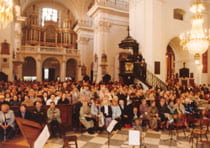 The 16th edition of the International Sacred Music Festival takes place between May 28 and June 4, 2006 in Warsaw. The inaugurating concert took place in John the Baptist Cathedral and the following concerts take place in churches around Warsaw. The idea of the festival is to present Polish and international musical works related to Catholicism and other religions. The festival is one of the more important musical events in Warsaw. Cardinal Józef Glemp is the official patron of the festival and during the festivities he will award a “Silver Pipe Reed” for special achievements in the development of sacred music in Poland. The festival is organized by the Sacred Music Festival Foundation. For the detailed program, visit: www.kapitula.org/mfmskal.html.
The 16th edition of the International Sacred Music Festival takes place between May 28 and June 4, 2006 in Warsaw. The inaugurating concert took place in John the Baptist Cathedral and the following concerts take place in churches around Warsaw. The idea of the festival is to present Polish and international musical works related to Catholicism and other religions. The festival is one of the more important musical events in Warsaw. Cardinal Józef Glemp is the official patron of the festival and during the festivities he will award a “Silver Pipe Reed” for special achievements in the development of sacred music in Poland. The festival is organized by the Sacred Music Festival Foundation. For the detailed program, visit: www.kapitula.org/mfmskal.html.
IX Film Music Festival In Łódź
 This year the Film Music Festival in Łódź is focused on the music of Henryk Kuźniak, composer of scores to such famous Polish movies as Vabank and Seksmisja. The festival starts on June 1 and ends June 4. The festival will include concerts, expositions and screenings of films with original music by Kuźniak.
This year the Film Music Festival in Łódź is focused on the music of Henryk Kuźniak, composer of scores to such famous Polish movies as Vabank and Seksmisja. The festival starts on June 1 and ends June 4. The festival will include concerts, expositions and screenings of films with original music by Kuźniak.
For over 20 years, Henryk Kuźniak has served as a professor at the State Film, TV and Theater School in Łódź. He is the author of scores to over 150 short, document and feature movies as well as TV shows.
This festival was established in 1997 and every edition is dedicated to a single composer. The past festivals honored the following composers: Wojciech Kilar, Krzysztof Komeda, Michał Lorenc, Zygmunt Konieczny, Andrzej Korzyński, Krzesimir Dębski, Jan Kanty Pawluśkiewicz and Henry Vars.
Contemporary Music In Kraków
The International Festival of Contemporary Music “Days of Kraków Composer’s Music” will take place between June 1 and 11 and is organized by the Kraków chapter of the Polish Composer’s Union (ZKP). As usual, in addition to the many planned concerts and premieres, there will be meetings with composers, artists and workshops about the latest music. This year for the first time the festival will also include the 1st International Festival of Young Composers and Performers: “New Music – New Faces”. For the program of the festivals please go to: www.zkp.krakow.pl.
II Wrocław Film Music Festival
 The Wrocław Film Music Festival will take place between June 2 and June 10 in the Wrocław Philharmonic Concert Hall. During the four concerts planned, the audience will hear film and TV music by Krzesimir Dębski (pictured at right) including the premiere performance of his new scores for two Charlie Chaplin movies. The films will be projected while the music is played. Also performed will be the music from Amadeus and hit songs and themes from the 50’s and the 60’s motion pictures. For a detailed program go to:www.filharmonia.wroclaw.pl.
The Wrocław Film Music Festival will take place between June 2 and June 10 in the Wrocław Philharmonic Concert Hall. During the four concerts planned, the audience will hear film and TV music by Krzesimir Dębski (pictured at right) including the premiere performance of his new scores for two Charlie Chaplin movies. The films will be projected while the music is played. Also performed will be the music from Amadeus and hit songs and themes from the 50’s and the 60’s motion pictures. For a detailed program go to:www.filharmonia.wroclaw.pl.
Recitals In Łazienki Królewskie Park
The Sunday tradition of piano recitals in Łazienki Królewskie Park continues in June with the following artists performing:
- Sunday, June 4: 12:00 pm – Ewa Osińska, 4:00 pm – Edward Wolanin
- Sunday, June 11: 12:00 pm – Paweł Filek, 4:00 pm – Tadeusz Chmielewski
- Sunday, June 18: 12:00 pm – Filip Wojciechowski, 4:00 pm – Piotr Szychowski
- Sunday, June 25: 12:00 pm – Bronislawa Kawalla, 4:00 pm – Magdalena Lisak
For additional information and future programs please visit: www.nifc.pl.
Discography
New Releases From DUX
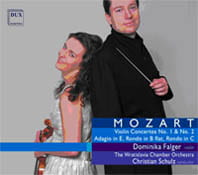 MOZART – Violin Concertos No. 1 & 2
MOZART – Violin Concertos No. 1 & 2
Program also includes Adagio in E, Rondo in B flat, Rondo in C
Dominika Falger – violin; Wratislavia Chamber Orchestra; Christian Schulz – cond.
DUX 0453
 Karlowicz, Szymanowski – Violin Concertos
Karlowicz, Szymanowski – Violin Concertos
Piotr Plawner – violin; Zielona Góra Philharmonic Orchestra; Czesław Grabowski – cond.
DUX 0450
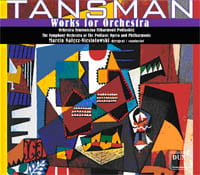 Aleksander Tansman – Works for Orchestra
Aleksander Tansman – Works for Orchestra
Podlasian Philharmonic Orchestra; Marcin Nałęcz-Niesiołowski – cond.
DUX 0452
 Lutosławski Cello Concerto, Concerto for Orchestra
Lutosławski Cello Concerto, Concerto for Orchestra
Rafał Kwiatkowski, cello; Warsaw Philharmonic National Orchestra; Antoni Wit, cond. DUX 0499A11497
This release is Antoni Wit’s second recording of the Cello Concerto and Concerto for Orchestra by Lutosławski. The previous recordings were done for Naxos with the Polish Radio National Symphony Orchestra. This new recording with the Warsaw Philharmonic National Orchestra seems to be getting very good press. According to Arnold Whittall of The Gramophone, “The disc is very well recorded and worth investigating, especially if you want to explore how the estimable Wit’s interpretations sound alongside his earlier Naxos versions.”
Chopin Works
 Chopin Complete Works for Piano and Orchestra
Chopin Complete Works for Piano and Orchestra
Kun Woo Paik, piano; Warsaw Philharmonic; Antoni Wit, cond.
Decca 00289 475 1692
Pianist Kun Woo Paik’s recording of the complete works for piano and orchestra of Chopin was reviewed in this month’s Gramophone. Reviewer Bryce Morrison holds Paik’s virtuosic talents and performance personality in high regard for most of the recording, although at times he finds the performance fussy and overdone. “[In the Variations on ‘La ci darem la mano’], Paik is as buoyant, scintillating and fine-toned as even the most ardent lover of early Chopin could wish,” but in the Second Concerto, “the listener is left feeling he’s imprisoned in a hothouse, desperate for fresher, less lavishly perfumed air.” An excellent and well-recommended recording, none-the-less.
Panufnik Songs
 Beastly Tales
Beastly Tales
Patricia Rozario, soprano; Yvonne Howard, mezzo-soprano; Roderick Williams, baritone; City of London Sinfonia; Sian Edwards, cond.
EMI Classics 356 6922
This recent EMI Classics release includes Roxanna Panufnik’s settings of three poems taken from Vikram Seth’s Beastly Tales from Here and There. Roxanna writes, “These beautifully crafted and witty retellings of some internationally well-known stories—as well as a couple of new tales by Seth himself, including ‘The Frog and the Nightingale’—are intensely musical and immediately conjure up kaleidoscopic images and textures. Solo voices and orchestra are the ideal vehicle to bring them to life. So when Stephen Carpenter, chief executive of the City of London Sinfonia, asked me the composer’s dream question ‘If there was something you’d like to write for soloists and orchestra, what would it be?’ a happy five-year collaboration in a series of Beastly commissions ensued.” (quote taken from www.mdt.co.uk)
Chopin Waltzes
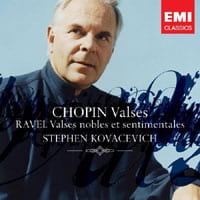 Chopin: Waltzes; Ravel: Valses nobles et sentimentales
Chopin: Waltzes; Ravel: Valses nobles et sentimentales
Stephen Kovacevich, piano
EMI Classics 346 7342
Stephen Kovacevich, known for his controversial interpretations of standard classical and romantic piano repertoire, takes on the Polish and French waltzes on this EMI Classics release. According to the EMI website (www.emiclassics.com), “Chopin’s waltzes are refined, charming and distinctively Parisian; in contrast to the more peasant-like, Ländler-inspired piano waltzes of Schubert, those of Chopin are intended for the aristocratic Parisian salon. Melodically captivating and beautifully constructed, each waltz shows the composer’s imaginative use of melody, harmony and rhythm, his exquisite taste. There are 14 waltzes in all.”
Chopin/Grieg Cello Sonatas
 Chopin Cello Sonata, Grieg Cello Sonata
Chopin Cello Sonata, Grieg Cello Sonata
Erling Bløndal Bengtsson, cello; Nina Kavtaradze, piano
Danacord DACOCD 644
A release of Polish and Scandinavian cello suites prepared by the Danacord gives the listener one of many possible interpretations but does not get very friendly press reception: “Good coupling but the players aren’t such a great couple,” says Bryce Morrison of The Gramophone.
Chopin Preludes DVD
 Chopin: 24 Preludes
Chopin: 24 Preludes
András Schiff, piano; Mischa Scorer, video director
Digital Classics DC10003
From the publisher: “The celebrated Hungarian pianist, András Schiff, plays the Chopin Preludes on an 1860 Pleyel Grand Piano, filmed in the beautiful, meticulously-restored Concert Hall of the Ancien Conservatoire in Paris, where Chopin himself frequently gave concerts.”
New Chopin Releases
 Chopin Vol. 2
Chopin Vol. 2
Sviatoslav Richter, piano
Doremi DNR7702
15th International Chopin Piano Competition
Various Artists
Dux Records DUX0068
Chopin, Complete Waltzes
Alexandre Tharaud, piano
Harmonia Mundi HMC901927
Chopin Piano Sonatas
Artur Pizarro, piano
Linn CKD250
Internet News
A Site Worth Seeing: Free Music
One of the best kept musical secrets in the world! For the past 15 months the Sibley Music Library at the Eastman School of Music in Rochester, New York has been putting rare out-of-print musical scores online for free downloading. Currently, the library hopes to digitalize 13,000 more works printed before 1922 so that they can be downloaded as well. Most of the pieces available will be works which are held either uniquely by the Sibley Music Library or by no more than two other music libraries.
There are many scores by Polish composers available. For example, at the moment there are eleven works of Zygmunt Stojowski that can be downloaded, with two more of his compositions in the In-Process file. If there is something in the library’s catalogue which has not been uploaded yet, one can make a request to have the work digitalized by filling out a request form: www.esm.rochester.edu/sibley/?page=request. The time needed to process the request takes between two and three weeks. Bravo, Eastman!
[JH]
Stojowski Collection Update
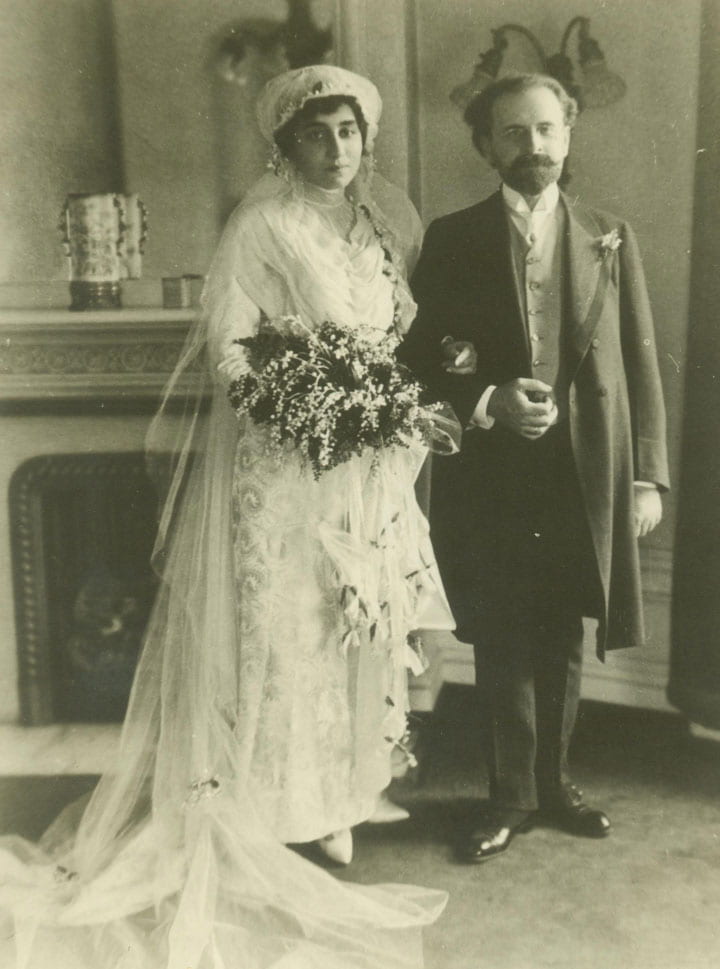
In 2005, the Polish Music Center at USC received a generous donation of manuscripts, sketches, correspondence, and published scores of music by Zygmunt (Sigismond) Stojowski (1870-1946) from the composer’s family. Now known as the Stojowski Collection, this new addition to the PM archive consists of 32 boxes of varying sizes. During the summer of 2005, the Stojowski Collection was appraised by a specially hired expert. Although study copies will remain in the Polish Music Center, the originals will reside permanently in Special Collections at the Doheny Library on the USC campus. In the coming months, as the Collection’s detailed inventory is being made, we will continue publishing the contents in our Newsletter, informing our public of this important legacy left by a fascinating and undeservedly forgotten composer. All inquiries regarding the Stojowski Collection should be directed to the Polish Music Center at USC via e-mail to: polmusic@thornton.usc.edu.
The following is Part 2 of our report on the contents of Box III of the Stojowski Collection.
[MZ]
BOX III
Case XIII: Biographical Information & Testimonials
- Envelope no. 1:“Paderewski endorses Stojowski.” Transcript of a note, dated 13 May 1924, Hotel Gotham, New York, with the facsimile of Paderewski’s signature under the text. 1 page, numerous copies
- Envelope no. 2:“Stojowski, Sigismond-Pianist, Composer, Teacher.” A biographical entry from “Who’s Who Today in the Musical World,” 1937. 1 page, numerous copies
- Envelope no. 3:3×5 cards with entries on Stojowski’s compositions and recordings
- Folder no. 4:Copies of naturalization certificates for Sigismond Stojowski and Luisa Stojowski; copy of a marriage certificate of Sigismond and Luisa Stojowski
- Folder no. 5:Biographies of Stojowski (several versions, written at various times, undated, not signed, some incomplete, some with corrections and amendments), typed, 9 pages. Also includes “Weekly notices”—a bulletin from the Church of St. Ignatius Loyola, New York City, dated 6 April 1947, listing the date of a memorial mass for Stojowski (8 April)
- Folder no. 6:Various documents on Stojowski’s sons: Copy of a Bulletin de naissancefor Henri Stojowski (copy, in French, 1 page); Data Sheet for Ignatius L. Stojowski (copy, typewritten, 1 page); Henry J. Stojowski, Architect (a CV, in English, 10 pages, stapled); Alfred J. Stojowski, MD (in English, printout from a website, 3 pages)
- Folder no. 7:A pamphlet entitled Odezwa do towarzystw![An Appeal to Civic Societies], in Polish, 3 pages. Dated from 1921, it contains Stojowski’s appeal to Polish Americans to participated in a “Festival and Exhibit of Three Centuries of Immigrant Contributions to our National Life”
Case XIV: Teaching Activities
Contains bulletins of the Stojowski Students’ Association (including the news of Stojowski’s concerts and those by his students), and the Von Ende Music School materials (including biographies of instructors, photographs, fee schedules, description of school facilities, etc.)
Case XV: Concert Programs
Contains numerous concert programs from Europe and the Americas, solo, chamber music, and with orchestra, spanning the entire performing career of Sigismond Stojowski.
Case XVI: Press Clippings And Interviews
Contains numerous reviews, press clippings, and notices from Europe and the US; also includes a substantial article in the September 1937 issue of the Etude Magazine on the subject of the art of practicing.
Case XVII: Lectures & Articles On Music (Part 1)
- Folder no. 1:Lecture on Chopin’s Nocturne in C minor, Op. 48. In English, 3 pages, typed
- Folder no. 2:Address on the topic of Polish immigration and culture in the US. In Polish, 3 pages, typed
- Folder no. 3:“Paderewski, the Unique”—an article in The Young Music Lover, February 1932, In English, 3 pages with 1 photo of Paderewski
- Folder no. 4:Chopin and the Music of Poland—an article in the program booklet for the Chopin festival, organized by the Polish University Club and the Newark Music Foundation, held in Newark NJ, 18 October 1930. Includes concert programs, photos and biographies of performers
- Folder no. 5:“Stojowski 100 Years Later”—an article by Frank Cooper in the December 1970 issue of the Clavier Magazine. With photographs and copies of Stojowski’s manuscripts. Also contains Stojowski’s article On Performing a Chopin Mazurka[Op. 30 no. 1] with musical examples and typewritten notes to the article
- Folder no. 6:Turgot et l’Indépendence Américaine. In French, 3 pages, 2 copies, typewritten
- Folder no. 7:Parsifal—Famoso drama místico-musical de Wagner. In Spanish, 11 pages, typewritten
- Folder no. 8:Chapter I—Nature’s Ways and Music’s Needs; Arts and Sport—The Calling of Virtuosity. Draft for a book [?]—12 pages, numbered, with a handwritten draft appended to the typescript
- Folder no. 9:“It is only birds and men that make music in this world.” Untitled typescript of 11 pages, very fragile. Possibly part of the ms in Folder no. 8? 3 copies, some with hand-entered corrections by the author
- Folder no. 10:“II. The pendulum of a clock swings up and down, back and forth—it sinks after having risen and risen after having sunk.” Untitled draft, possibly part of the ms in Folder no. 8. Typed with hand corrections, 10+ pages, two copies
- Folder no. 11:“III. Among the pall-bearers at Beethoven’s funeral in Vienna, there was a little man, bespectacled and school-masterly, very shy and awkward looking, who followed with evident emotion the great master to his heaven of rest, little aware that he himself was marked by the sign of genius, awe-inspired as he was before Beethoven and also with the stigma of death, alas, in spite of his young years.” Untitled draft, possibly part of the ms. in Folder no. 8. Typed, 10 pages, 3 copies, some with hand corrections
- Folder no. 12:MUSIC OF THE PEOPLE—Its Origin and Development, illustrated by Folk-Songs from many lands. 15 pages, typewritten. Possibly connected to a lecture [to be cross-referenced with Stojowski’s ms arrangements of folk songs from different lands in the Collection]. Also contains a fragment of an earlier typescript draft for the same text (pages 5-11) with hand annotations
- Folder no. 13:“An old Polish proverb says: ‘The peasant talked to the picture but not once did the picture speak.” An address[?] possibly to the College Art Association [a pencil note on top of p. 1]. Typed, 5 pages
- Folder no. 14:THE GREATER CHOPIN—Series of Twelve Lecture Recitals given by Sigismond Stojowski at the Juilliard School of Music July-Aug. 1944. Typed, 50 pages, dated 11 August 1944
- Folder no. 15:A convention address by Madame Stojowska about piano practicing, Paderewski, Stojowski, etc. Typed with hand-entered corrections. 12 pages. The original folder has a pencil marking: “Union. N.J. | Lecture | Oct 30, 1977”
- Folder no. 16:“WHEREVER THERE IS NO MUSIC, LIFE ALSO CEASES” —an address by Sigismond Stojowski. Typed, 4 pages
- Folder no. 17:The Art of Chopin. Possibly a lecture or address. Typed, 5 pages
- Folder no. 18:“The spoken word is not a musician’s natural mode of expression.” Possibly a lecture or address, given in Scotland [?]. Typed, 4 pages, incomplete. Dated April 13, 1942
- Folder no. 19:“To introduce to you Mr. Downes, the eminent critic of The New York Times, is for me a matter of gratification; for you one of superfluity.” 7 pages, typed, with annotations
- Folder no. 20:“Practice As An Art” —an article by Stojowski. The Etude Magazine, September 1937
- Folder no. 21:“In honor of Znaniecki—Polish Institute Dinner.” Typed, 4 pages, in English
- Folder no. 22:“Dear Mr. Editor:”—a letter to the New York Times [?]. Typed, 2 pages, in English, with numerous corrections and additions. 2 copies
- Folder no. 23:“The most appropriate way of celebrating a Cervantes’ anniversary would be to produce one his immortal plays.” A lecture-recital [?] on music of Spain. Typed, 3 pages, incomplete. With a separate page, numbered “7,” discussing music by Daquin. Incomplete
- Folder no. 24:Address by Sigismond Stojowski on Polish Day. Assembly Hall—N.Y. World’s Fair, October 1940. In English, typed, 3 pages with hand corrections, incomplete
- Folder no. 25:“… some fraud of his Olympian colleague, Apollo denounces him to the father of the gods.” Fragment of an article [?], typed, 5 pages (numbered 2-6) with a duplicate version of p. 5
- Folder no. 26:Interpretations of Piano Literature in Historical Perspective. A course outline [?], typed, 1 page
- Folder no. 27:Poland’s Struggle and the World’s Peace. An article in The North American Review, Vol. 211, June 1920
- Folder no. 28:Program notes for Suite in E-flat, Op. 9. Typed, with hand-entered corrections, in English, 1 page
Case XVIII: Lectures & Articles On Music (Part 2)
- Folder no. 1:The Art of Chopin. A lecture [?]. Typescript with corrections and annotations. 6 pages, 2 copies. Includes a list of slides: “Lantern slides for the Chopin Course”—possibly connected to the lecture
- Folder no. 2:W 95 rocznic?. A radio broadcast by Stojowski on the 95th anniversary of Chopin’s death [17 October 1944]. Typescript, 4 pages
- Folder no. 3:Program notes. Discussing various genres of music by Chopin (Polonaise, Mazurka, Nocturne, Etudes & Preludes, Ballade, Scherzo). In English, typed, 7 pages
- Folder no. 4:Address on Chopin. In Spanish, typed, 5 pages. Annotation on the back in Stojowski’s hand: “Chopin (Spanish) | Havana, Cuba.”
- Folder no. 5:Mazurkas. Includes xerox copies of Stojowski’s analysis and interpretative remarks on various Mazurkas by Chopin. Typed script, with hand-drawn musical examples. Also includes copies of Chopin’s scores with Stojowski’s fingering. [Note: this is the original folder, with the title written by the author]
- Folder no. 6:Notes’ duplicates to p. 26. Contains the original typescript, with corrections and musical examples of Stojowski’s analysis and interpretative remarks on various Mazurkas by Chopin. Also includes copies of Chopin’s scores with Stojowski’s fingering.
Anniversaries
Born This Month
- June 1, 1909 – Maria DZIEWULSKA, composer and theoretician (d. 2006)
- June 4, 1845 – Aleksander POLIŃSKI, music historian (d. 1916)
- June 4, 1784 – Adam CZARNOCKI, music ethnographer (d. 1825)
- June 5, 1865 – Felicjan SZOPSKI, composer and music critic (d. 1939)
- June 6, 1929 – Bogusław SCHAEFFER, composer, writer
- June 12, 1897 – Aleksander TANSMAN, composer and pianist,
- June 16, 1923 – Henryk CZYŻ, conductor and composer
- June 17, 1930 – Romuald TWARDOWSKI, composer
- June 28, 1895 – Kazimierz SIKORSKI, composer and teacher
- June 28, 1904 – Włodzimierz POŹNIAK, musicologist
Died This Month
- June 1, 1869 – Jozef DULEBA, pianist and participant of January Uprising, died in a duel (b. 1843)
- June 3, 1904 – Daniel FILLEBORN, singer and performer of main parts in Moniuszko’s operas (b. 1841)
- June 4, 1872 – Stanisław MONIUSZKO, Father of Polish National opera (b. 5 May 1819)
- June 5, 1964 – Henryk SZTOMPKA, pianist, Chopin specialist, teacher
- June 9, 1932 – Natalia JANOTHA, pianist and composer, student of Clara Wieck-Schumann, Royal Pianist in London, 400 opus numbers (b. 1856)
- June 10, 1953 – Grzegorz FITELBERG, conductor, composer, great promoter of new music, esp. Szymanowski (b. 1879)
- June 28, 1938 – Ludwik DRZEWIECKI, pianist and father of Zbigniew Drzewiecki
- June 29, 1945 – Kazimierz GARBUSIŃSKI, pianist, organist, composer
- June 30, 1957 – Michał ŚWIERZYŃSKI, composer and choral conductor
Obituary
Franciszek Wybrańczyk
 On May 31, 2006 Franciszek Wybrańczyk passed away. He co-created and for many years was the director of one of the greatest Polish orchestras, Sinfonia Varsovia. After retiring he was an honorary director of the ensemble. Franciszek Wybrańczyk became the director of the Polish Chamber Orchestra in 1972 which was at the time conducted by Jerzy Maksymiuk. Quickly the ensemble was recognized as one of the best Polish orchestras. In 1984, based on the personnel of this group and with Sir Yehudi Menuhin as the First Guest Conductor, Mr. Wybrańczyk created the Sinfonia Varsovia orchestra. Throughout the many years of concert activities, he made sure that the ensemble was performing at the highest international level, in the best concert halls of the Americas, Europe and Japan. He also served as chairman of the Sinfonia Varsovia Foundation. The funeral will be held on June 7 at the Saint Josaphat Church in Warsaw.
On May 31, 2006 Franciszek Wybrańczyk passed away. He co-created and for many years was the director of one of the greatest Polish orchestras, Sinfonia Varsovia. After retiring he was an honorary director of the ensemble. Franciszek Wybrańczyk became the director of the Polish Chamber Orchestra in 1972 which was at the time conducted by Jerzy Maksymiuk. Quickly the ensemble was recognized as one of the best Polish orchestras. In 1984, based on the personnel of this group and with Sir Yehudi Menuhin as the First Guest Conductor, Mr. Wybrańczyk created the Sinfonia Varsovia orchestra. Throughout the many years of concert activities, he made sure that the ensemble was performing at the highest international level, in the best concert halls of the Americas, Europe and Japan. He also served as chairman of the Sinfonia Varsovia Foundation. The funeral will be held on June 7 at the Saint Josaphat Church in Warsaw.
